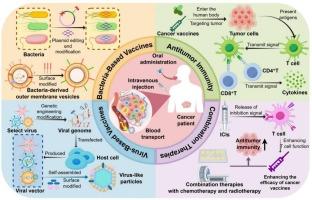Microorganism delivery of cancer vaccines
IF 11.5
1区 医学
Q1 CHEMISTRY, MULTIDISCIPLINARY
引用次数: 0
Abstract
Cancer immunotherapeutic vaccines offer a promising approach which can activate the immune system to target and kill cancer cells. Despite great progresses, challenges still exist in clinical practice, including immunosuppressive tumor microenvironment, tumor heterogeneity as well as low delivery efficiency. Microbe-based cancer vaccines, leveraging the abilities of bacteria and viruses to target hypoxic tumor regions/infect cancer cells as well as enhance the immunogenicity of tumor microenvironment, have attached prominent attention for the potential to revolutionize vaccine designing. Particularly, advances in synthetic biology enable precise expression of tumor antigens or immune checkpoint inhibitors in microbial cancer vaccines, furthermore facilitating personalized immunotherapeutic potential. This review describes the interactions between microorganisms and the host immune system, and systematically introduces the tumor-targeting mechanisms of microorganisms. Specifically, we provide a comprehensive describe about advantages and applications of bacteria, as a type of microbial vaccines, for antitumor treatment. We also delve into multiple kinds of viral vaccines and virus-like particles for cancer therapy. Recent examples of combining microbial vaccines with other therapeutic modalities designed to combat tumors are highlighted. Last but not least, we address the underlying challenges of microbial cancer vaccines. Meanwhile, this review prospects that microbial cancer vaccines represents a transformative immunotherapy strategy with tumor-targeting and immune-activating potential.

微生物递送癌症疫苗
癌症免疫治疗疫苗提供了一种很有前途的方法,可以激活免疫系统来靶向和杀死癌细胞。尽管取得了很大的进展,但在临床实践中仍存在着肿瘤微环境免疫抑制、肿瘤异质性、给药效率低等挑战。基于微生物的癌症疫苗,利用细菌和病毒靶向肿瘤缺氧区/感染癌细胞的能力,增强肿瘤微环境的免疫原性,具有引起疫苗设计革命的潜力,备受关注。特别是,合成生物学的进步使肿瘤抗原或免疫检查点抑制剂能够在微生物癌症疫苗中精确表达,进一步促进个性化免疫治疗的潜力。本文综述了微生物与宿主免疫系统的相互作用,系统地介绍了微生物的肿瘤靶向机制。具体来说,我们提供了一个全面的描述细菌的优势和应用,作为一种微生物疫苗,抗肿瘤治疗。我们还深入研究了多种用于癌症治疗的病毒疫苗和病毒样颗粒。强调了最近将微生物疫苗与其他治疗方式相结合以对抗肿瘤的例子。最后但并非最不重要的是,我们解决微生物癌症疫苗的潜在挑战。同时,本文展望了微生物癌症疫苗是一种具有肿瘤靶向和免疫激活潜力的变革性免疫治疗策略。
本文章由计算机程序翻译,如有差异,请以英文原文为准。
求助全文
约1分钟内获得全文
求助全文
来源期刊

Journal of Controlled Release
医学-化学综合
CiteScore
18.50
自引率
5.60%
发文量
700
审稿时长
39 days
期刊介绍:
The Journal of Controlled Release (JCR) proudly serves as the Official Journal of the Controlled Release Society and the Japan Society of Drug Delivery System.
Dedicated to the broad field of delivery science and technology, JCR publishes high-quality research articles covering drug delivery systems and all facets of formulations. This includes the physicochemical and biological properties of drugs, design and characterization of dosage forms, release mechanisms, in vivo testing, and formulation research and development across pharmaceutical, diagnostic, agricultural, environmental, cosmetic, and food industries.
Priority is given to manuscripts that contribute to the fundamental understanding of principles or demonstrate the advantages of novel technologies in terms of safety and efficacy over current clinical standards. JCR strives to be a leading platform for advancements in delivery science and technology.
 求助内容:
求助内容: 应助结果提醒方式:
应助结果提醒方式:


